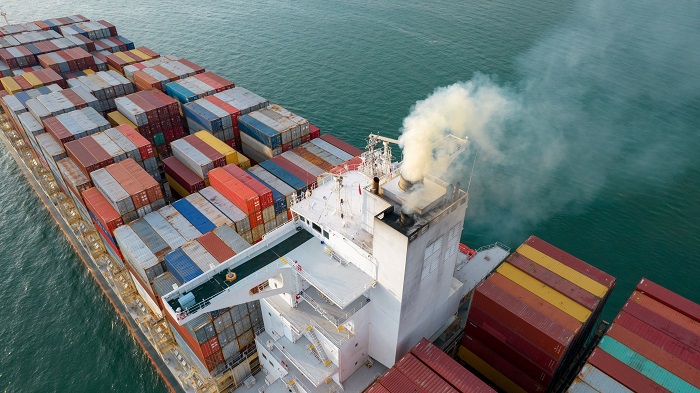(LONDON) — In what would be a first for any industrial sector, the International Chamber of Shipping (ICS) has put forward a comprehensive proposal for a global levy on carbon emissions from ships.
ICS, which represents the world’s national shipowner associations and more than 80 percent of the merchant fleet, presented a submission to the United Nations on Friday, calling for an internationally accepted market-based measure (MBM) to accelerate the uptake and deployment of zero-carbon fuels.
According to papers handed to the International Maritime Organization (IMO), the U.N.’s regulatory body on shipping, the levy would be based on mandatory contributions by ships trading globally, exceeding 5,000 gross tonnage, for each tonne of CO2 emitted. The money would go into an IMO climate fund which, as well as closing the price gap between zero-carbon and conventional fuels, would be used to deploy the bunkering infrastructure required in ports throughout the world to supply fuels such as hydrogen and ammonia, ensuring consistency in the industry’s green transition for both developed and developing economies.

Shipping is responsible for approximately 2 percent of global carbon emissions and the IMO has recognized the need for urgent action to decarbonize. The industry is desperate to see zero-carbon ships brought to the water by shipyards by 2030. However, at current rates of production, zero-carbon fuels are not commercially available at the scale needed for the global fleet. The carbon levy is intended to expedite the creation of a market that makes zero-emission shipping viable.
The fund would calculate the climate contributions to be made by ships, collect the contributions, and give evidence they have been made. ICS hopes that it would also support new bunkering infrastructure so that new fuels, when developed, can be made available globally and from as many ports as possible.
To minimize any burden on U.N. member states and ensure the rapid establishment of the carbon levy, the framework proposed by industry would utilize the mechanism already proposed by governments for a separate $5 billion fund to accelerate the development of zero-carbon technologies, which the IMO is scheduled to approve at a meeting in November immediately following COP 26.
“What shipping needs is a truly global market-based measure like this that will reduce the price gap between zero-carbon fuels and conventional fuels,” said Guy Platten, secretary-general of the ICS. “The rapid development of such a mechanism is now a vital necessity if governments are to match actions with rhetoric and demonstrate continued leadership for the decarbonization of shipping.
“There’s no question that improvements in technology can enable the transition to zero-emission shipping. However, huge leaps must still be taken if we’re to achieve the readiness levels needed for deployment at scale. This includes building the necessary infrastructure to support such as transition,” he said.
“We need to be able to put zero-emission ships in the water by 2030 without challenging price and safety issues. If the IMO lends its backing to our proposal, then we may yet be able to change this and deploy technologies economically and equitably.”
ICS believes that a mandatory global levy-based MBM is strongly preferable over any unilateral, regional application of MBMs to international shipping, such as that proposed by the European Commission, which wishes to extend the EU Emissions Trading System to international shipping. A piecemeal approach to MBMs (the EU ETS will only apply to about 7.5 percent of global shipping emissions) will ultimately fail to reduce global emissions from international shipping to the extent required by the Paris Agreement, while significantly complicating the conduct of maritime trade.
– International Chamber of Shipping
